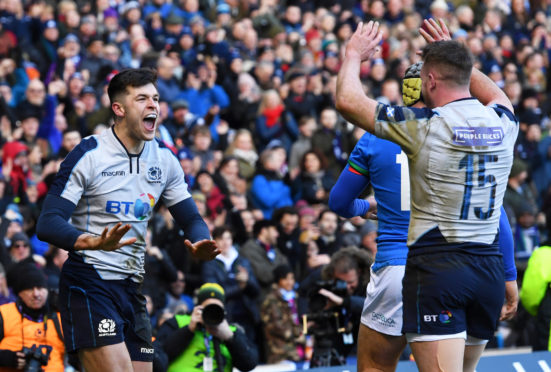There’s always an “aye, but” with Scotland.
Even in the greatest of triumphs – well maybe not 1984 and 1990, but most other times – there’s a caveat. Something that stops us getting too self-reverential, something many Irish rugby fans might now understand waking up on Sunday morning.
On Saturday at Murrayfield with 62 minutes gone, it seemed Scotland were poised to get the rout of a win over Italy that they’ve always wanted but never quite achieved since Five Nations became Six.
You know, the sort that England, Ireland and Wales habitually do at home to the Italians, a 40-point (at least) howking, turning the screw especially in the final minutes to pad the scoreline.
33-3 just after the hour actually represented a record lead over Italy, and all of a sold-out Murrayfield was expecting more.
Instead, Italy scored three tries – what Americans would call “garbage” scores, coming long after the contest was decided and doing little other than to make the well-beaten team feel a bit better about themselves.
And of course, to cause the winning team to be a lot more reflective than they would otherwise have been – “Great first hour, aye, but…”
Maybe that’s a good thing and part of our nature. Gregor Townsend was quick to argue that the lapses of the final 15 minutes would serve “to keep our feet on the ground”.
Those feet were maybe anchored a little more a few minutes later, when Italy coach Conor O’Shea regailed the press of the extra sick bags and stalwart stewardesses on the flight from Rome as his team were struck down by a stomach bug.
That could explain why O’Shea seemed so sanguine about a loss in the game all Italy expects is their best chance to win each Six Nations, although perhaps – not without foundation – they’re targeting France instead this year.
But Scotland weren’t exactly running at full bore either. There were 26 listed injury absentees – the real number of genuine test candidates on that list is actually about 18, but that’s still substantial for a country of Scotland’s resources – and Sam Skinner lasted barely 10 minutes before the ankle injury that’s probably going to lengthen the list to 27 and keep him out of the rest of the championship.
Scotland could only beat the team presented to them with the team they had, and they were doing so with control, commitment and complete domination in that first hour. It wasn’t perfect by any means, with two glaring try-scoring chances passed up in the first five minutes alone, but the variety and scope of Scotland’s attacking play had the Italians under constant pressure.
At the centre of this was Finn Russell, assuming the leadership and tactically astute playmaking role which should now be easy for him as a well-established international 10.
His kicking from hand, but for one hopeful clip over the top that eventually resulted in Italy’s only three points, was exemplary, pinning the Italians in their 22 and the cross kick for Blair Kinghorn’s first try seamlessly executed.
Sam Johnson, making his debut, varied his play equally well. Kinghorn bagged three tries – the first hat-trick for Scotland in the championship since Iwan Tukalo in 1989 and only the second since 1927 – and the man of the match award.
But since former attack coach Jason O’Halloran introduced a wider game under Vern Cotter, it’s clearly the best time to be a wing for Scotland since Ian Smith was rattling the tries in during the 1920s. Roger Baird and Sean Lamont have every right to be a little jealous.
Upfront the Scots had almost complete control. The Edinburgh front five pummelled the Italians, and Jamie Ritchie again had a storming game. The former Howe of Fife flanker, who was playing in his first Six Nations contest, has taken to the international game in quite remarkable and outstanding fashion.
But Scotland’s casualty list came into play for the last quarter. Skinner’s early departure meant both locks, so effective for the first hour, had to stay on for the duration and were gasping a bit at the end.
The reinforcements from the bench, Josh Strauss excepted, didn’t add much and Townsend will be happy if he can call on a few older heads for next week against Ireland as he filters in more established players coming back from injury.
Saturday against Ireland will be “an open selection”, stressed Townsend, indicating that maybe even hat-trick heroes are expendable, given that the Irish offer considerably greater challenges and totally different tactical requirements.
“Ireland will test us in every area,” said the coach. “They have an excellent set piece, with their scrum, their line out maul, they do special plays which seem to work out where a defence might be vulnerable on first, second, third, fourth phase so we need to be really switched on defensively.
“They are the complete package so we know we will have to be at our very best. We’ll take confidence from parts of today and from how we played against them in Dublin for the first 40 minutes.
“They are a better team than that now, they have improved since then, so we have got to show that we have improved and we’re capable of taking our chances this time.”
Ireland may be a little beaten up after their brutal game with England, but are still light years ahead of Italy.
Saturday at Murrayfield was good enough, but not the sort of statement to make anyone else in the championship take much notice. Maybe that’s the way we prefer it.


